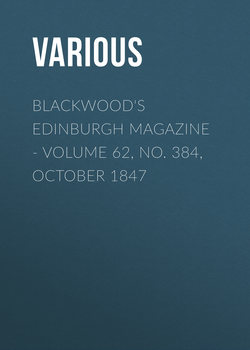Blackwood's Edinburgh Magazine - Volume 62, No. 384, October 1847

Реклама. ООО «ЛитРес», ИНН: 7719571260.
Оглавление
Various. Blackwood's Edinburgh Magazine - Volume 62, No. 384, October 1847
WORKS OF HANS CHRISTIAN ANDERSEN.1
THE EMPEROR'S NEW CLOTHES
THE VISION OF CAGLIOSTRO
TIBERIUS
AGRIPPA
MILTON
MIRABEAU
BEETHOVEN
MAGA IN AMERICA
THE TIMES OF GEORGE II.18
ART IN THE EARLY CHRISTIAN AGES.19
THE PORTRAIT
CHAPTER I
CHAPTER II
HOUNDS AND HORSES AT ROME
ENGLISH KENNEL
THE STEEPLE-CHASE
ROMAN DOGS
SONG,
MY FRIEND THE DUTCHMAN
Отрывок из книги
If our readers have perchance stumbled upon a novel called "The Improvisatore" by one Hans Christian Andersen, a Dane by birth, they have probably regarded it in the light merely of a foreign importation to assist in supplying the enormous annual consumption of our circulating libraries, which devour books as fast as our mills do raw cotton;—with some difference, perhaps, in the result, for the material can rarely be said to be worked up into any thing like substantial raiment for body or mind, but seems to disappear altogether in the process. As the demand, here, exceeds all ordinary means of supply, they may have been glad to see that our trade with the North is likely to be beneficial to us, in this our intellectual need. Its books may not be so durable as its timber, nor so substantial as its oxen, but then they are articles of faster growth, and of easier transportation. To free-trade in these productions of the literary soil, not the most jealous protectionist will object; and they have, perhaps, been amused to observe how the mere circumstance of a foreign origin has given a cheap repute, and the essential charm of novelty, to materials which in themselves were neither good nor rare. The popular prejudice deals very differently with foreign oxen and foreign books; for, whereas an Englishman has great difficulty in believing that good beef can possibly be produced from any pastures but his own, and the outlandish beast is always looked upon with more or less suspicion, he has, on the contrary, a highly liberal prejudice in favour of the book from foreign parts; and nonsense of many kinds, and the most tasteless extravagancies, are allowed to pass unchallenged and unreproved, by the aid of a German, or French, or Danish title-page.
Nay, the eye is sometimes tasked to discover extraordinary beauty, where there is nothing but extraordinary blemish. Where the shrewd translator had veiled some absurdity or rashness of his author, the more profound reader has been known to detect a meaning and a charm, which "the English language had failed adequately to convey;" and he has, perhaps, shown a sovereign contempt for "the bungling translator," at the very time when that discreet workman had most displayed his skill and judgment. The idea has sometimes occurred to us—Suppose one of these foreign books were suddenly proved to be of genuine home production—suppose the German, or the Dane, or the Frenchman, were discovered to be a fictitious personage, and all the genius, or all the rant, to have really emanated from the English gentleman, or lady, who had merely professed to translate—presto! how the book would instantly change colours! What a reverse of judgment would there be! What secret misgivings would now be detected and proclaimed! What sudden outpourings of epithets by no means complimentary! How the boldness of many a metaphor would be transformed into sheer impudence! How the profundities would clear up, leaving only darkness behind! They were so mysterious—and now, throw all the light of heaven upon them, and there is nothing there but a blunder or a blot.
.....
What a change now in his destiny! The poor shoemaker's child, that wandered wild in the woods of Odense, and afterwards wandered almost as wild and as solitary in the streets of Copenhagen—who was next imprisoned in a school with dictionary and grammar—is now free again—may wander with wider range of vision—is a traveller—and in Italy! But the sensitive temper of Andersen, we are afraid, hardly permitted him to enjoy, as he might have done, his full cup of happiness. Vanity is an unquiet companion; he should have left it behind him at home; then the little piece of malice which he records of one of his friends would not have disturbed him as it appears to have done.
"During my journey to Paris, and the whole month that I spent there, I heard not a single word from home. Could it be that my friends had nothing agreeable to tell me? At length, however, a letter arrived; a large letter, which cost a large sum in postage. My heart beat with joy, and yearning impatience; it was indeed my first letter. I opened it, but I discovered not a single written word—nothing but a Copenhagen newspaper, containing a lampoon upon me, and that was sent to me all that distance with postage unpaid, probably by the anonymous writer himself. This abominable malice wounded me deeply. I have never discovered who the author was; perhaps he was one of those who afterwards called me friend, and pressed my hand. Some men have base thoughts; I also have mine."
.....